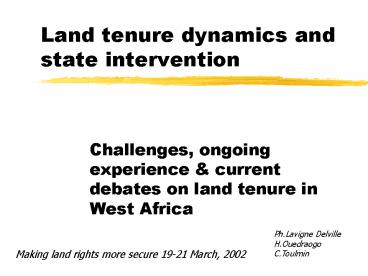Land tenure dynamics and state intervention - PowerPoint PPT Presentation
1 / 21
Title:
Land tenure dynamics and state intervention
Description:
... to local structures : decentralised management (Madagascar) ... Decentralisation: ... Decentralised local government and management of land ... – PowerPoint PPT presentation
Number of Views:29
Avg rating:3.0/5.0
Title: Land tenure dynamics and state intervention
1
Land tenure dynamics and state intervention
- Challenges, ongoing experience current debates
on land tenure in West Africa
Ph.Lavigne Delville H.Ouedraogo C.Toulmin
Making land rights more secure 19-21 March, 2002
2
Why discuss making land rights more secure?
- Some level of security needed to encourage
investment and productivity - Clarifying rules and mechanisms for access to
land essential for peaceful co-existence between
groups - Citizens should expect that the state recognises
and guarantees their land rights
3
Legislation from Independence onwards
- Long-standing legal pluralism, from colonial
times, makes land rights insecure - Procedures to gain legal recognition of land
rights are inaccessible to most people - Growing competition, poorly regulated conflicts
- For many natural resources, poorly defined rules
and rising demand have led to open access
4
- Gap between legality, legitimacy and actual
practice, makes regulation of land issues very
difficult and favours richer, more powerful actors
5
In 1980s, growing legal recognition of private
property rights
- State control intervention put in doubt
- Economic liberalisation and SAPs underway
- Growing conflict over resources
- Two common assumptions
- customary rules breakdown when the stakes rise
- delivering land titles a key means to avoid legal
dualism and encourage investment.
6
Emerging findings cast doubt on such assumptions
- No simple relationship between land titles
productivity - Customary systems no barrier to agricultural
intensification and strong market response - Local tenure systems dynamic provide secure
rights in most cases - Individualisation and land market development
underway in many places
7
- Conflict arrises when institutions for regulation
are weak or where there are multiple sources of
authority - Conflict less a product of competition for land
and natural resources, and more due to
uncertainty about rules for managing access
8
In the 1990s, innovative new approaches
- Finding ways to make existing rights and
practices more secure - Encouraging transfers between users
- Promoting adaptation of rights to new contexts
and opportunities
9
In West Africa, five new approaches...
- Identifying and mapping rights Rural Land Plans
(Côte dIvoire, Bénin, Guinée, Burkina Faso) - Codifying rules granting legal status
Codification (Niger) - Allocating responsibility for making and managing
rules to local structures decentralised
management (Madagascar)
10
- Making land transactions more secure by use of
written contracts (Guinée) - Land tenure monitoring systems as a means to
formulate new policy Observatoire du foncier
(Mali)
11
A range of legal and institutional innovations
- Home grazing lands (Niger)
- Local conventions (Mali)
- Land Commissions at Arrondissement and village
levels (Niger) - Tenure certificates (Côte dIvoire)
- Land registers (Comores)
- Much local rule making, committees, bye-laws,
etc. tried out by projects, pilot schemes...
12
Decentralisation Opportunities risks
- What tenure role for these new elected local
government structures? - Risks of centralisation for many local users
- Land issues increasingly tied up in local
politics and factions
13
Processes underway.
- Institutional and political landscape is changing
rapidly - Sectoral policy undergoing changes
- Measures partially achieved but still some
hesitation by the government to let go
14
Securing land rights - a new look
- Focus on rights and oligations, not ownership per
se - Security linked less to nature of rights held,
and more to their recognition, and whether
subject to effective contest by others
15
- Focus on securing rights rather than property
titles - Examining institutions (rules, structures) which
allocate, recognise arbitrate rights and ensure
they can be exercised effectively - A range of solutions, in response to needs of
diverse actors
16
Improve understanding of local institutions for
managing land
- Rules, rights and powers dynamic interplay
- Links between individual rights and collective
management - Rapidly changing rules, often challenged
- Local capacity to innovate and make new rules
- In places, tense relations between groups and
politicisation of land relations
17
- Today, role of local land tenure management
largely recognised - based on local principles, though subject to
contest negotiation - involving many different interests and structures
(customary leaders, councillors, technical
services, local government.) - working sometimes in harmony, sometimes in
contradiction.
18
- What rules structures can offer more secure
land rights, and how can government policy help? - Local rights or statutory legislation?
- What structure of authority has powers over land?
- What tools or methods to use?
19
Exchanging experience debating the options
- Recent research brings out new lessons and
experience with innovative approaches, their
benefits, relevance and limitations - Many new questions and issues raised
- To help take forward the process of more secure
rights to land.
20
New findings to share
- Decentralised local government and management of
land natural resources - a suitable local
mechanism? - Rural land plans cadastral systems
- Land transactions and secondary right how to
regulate land markets? - Pastoralism and natural resource management
establishing local control over access to
resources
21
Key issues to examine
- How can local rights practices be given legal
recognition? - Land tenure agricultural policy effieincy and
equity - Formalising rights, their documentation
arbitration - developing new skills - Opening up public debate of land tenure policy
options































